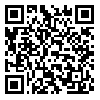Fri, Jan 30, 2026
| فارسی
Volume 18, Issue 1 (Spring 2016)
Advances in Cognitive Sciences 2016, 18(1): 1-13 |
Back to browse issues page
Download citation:
BibTeX | RIS | EndNote | Medlars | ProCite | Reference Manager | RefWorks
Send citation to:



BibTeX | RIS | EndNote | Medlars | ProCite | Reference Manager | RefWorks
Send citation to:
Keyvanara M, Monadjemi S A, Oreyzi H. Analysis of the Relevance between Human Brain Response to Stimulants and the Consumers’ Personality. Advances in Cognitive Sciences 2016; 18 (1) :1-13
URL: http://icssjournal.ir/article-1-342-en.html
URL: http://icssjournal.ir/article-1-342-en.html
1- Computer Engineering, Artificial Intelligence Department, Faculty of Computer Engineering, University of Isfahan, Isfahan, Iran.
2- Psychology Department, Faculty of Education and Psychology, University of Isfahan, Isfahan, Iran.
2- Psychology Department, Faculty of Education and Psychology, University of Isfahan, Isfahan, Iran.
Abstract: (3736 Views)
Objective: One of the key challenges in the study of psychological factors in drug-based research is that the causal reason through which the person consumes drugs is unknown. Whether the person starts using drugs owing to his/her personality or if the drug consumption leads to personality changes in a particular direction needs further elucidation.
Method: The present study used an existing mathematical model of personality to simulate human brain response to a single dose consumption of methamphetamine. Such simulations may potentially predict the consumers’ behavior with regard to their personality. The extraversion parameter in the calibrated model is 0.5 for introverts and 1.5 for extroverts. The data was collected from medium-term residential centers in Isfahan city.
Results: The results are considerable with regard to consumers’ personality types. Our findings indicated that one reason based on which consumers begin using stimulants roots in their extroversion personality type.
Conclusion: Artificial intelligence and computer simulations can be considered potential tools for the causal analysis of drug consumption. The observations can be used for interventional programs of drug misuse and reduction of individuals’ tendency toward the use of stimulants.
Method: The present study used an existing mathematical model of personality to simulate human brain response to a single dose consumption of methamphetamine. Such simulations may potentially predict the consumers’ behavior with regard to their personality. The extraversion parameter in the calibrated model is 0.5 for introverts and 1.5 for extroverts. The data was collected from medium-term residential centers in Isfahan city.
Results: The results are considerable with regard to consumers’ personality types. Our findings indicated that one reason based on which consumers begin using stimulants roots in their extroversion personality type.
Conclusion: Artificial intelligence and computer simulations can be considered potential tools for the causal analysis of drug consumption. The observations can be used for interventional programs of drug misuse and reduction of individuals’ tendency toward the use of stimulants.
Keywords: Mathematical model, Neural system simulation, Personality, Reduction of tendency to addiction
Type of Study: Research |
Subject:
Special
Received: 2015/01/30 | Accepted: 2015/09/24 | Published: 2016/05/21
Received: 2015/01/30 | Accepted: 2015/09/24 | Published: 2016/05/21
Send email to the article author
| Rights and permissions | |
 |
This work is licensed under a Creative Commons Attribution-NonCommercial 4.0 International License. |



